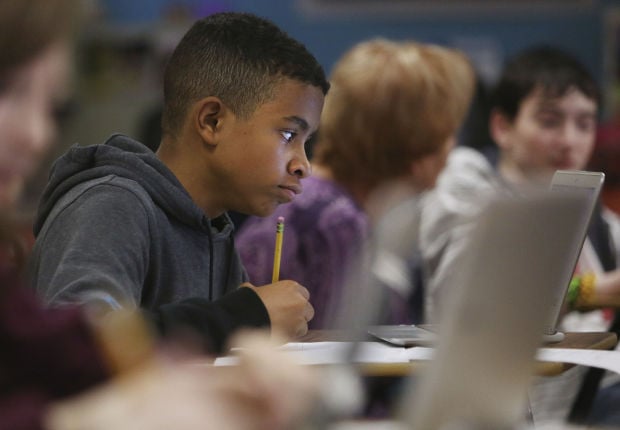PHOENIX т Ahead by 16,766 votes and with a widening lead, Proposition 123 has apparently been approved by voters, and Gov. Doug Ducey has declared its victory.
Figures as of late Thursday showed 520,425 votes in support of the proposition to boost school funding, with 503,659 against.
The largest share of votes to be tallied is in Maricopa County with 15,400 early ballots and about 1,270 provisional ballots where registrations need to be verified. But given the trend of votes counted in the previous 24 hours, there may not be enough uncounted ballots out there to make a difference.
Ducey, who put together the deal that went to УлшжжБВЅ voters in Tuesdayтs special election, used that margin to say Prop. 123 has won.
тThe votes have been counted, and the result is clear,т he said in a prepared statement Thursday evening.
People are also reading…
The governor said the package should put to rest a lawsuit filed by schools against the state six years ago for ignoring a voter mandate to boost aid to education annually to account for inflation.
тAfter years of lawsuits and fighting, we are moving forward and funding our teachers, students and schools instead of lawyers,т he said.
Ducey, who promised throughout the campaign that Proposition 123 was just a тfirst stepт in boosting school funding, sidestepped questions Thursday night about what comes next.
тWeтre going to take the rest of the day off,т he said. тWeтre going to celebrate a little bit.т
He said the coalition of business, legislative and education interests that negotiated the plan and pushed it through will remain intact.
тAnd weтre going to talk about how we continue to improve,т Ducey said.
Despite Duceyтs declaration of victory, state Treasurer Jeff DeWit, the highest-profile opponent of the school financing plan, said heтs not ready to concede.
тWith a vote this close still, it is important to wait until all the votes are counted,т he said Thursday evening.
Even presuming the apparent approval holds, the measure still has a significant legal hurdle.
On Wednesday, a Phoenix man asked a federal judge to block the change in withdrawals from the state land trust that Proposition 123 is designed to permit.
Michael Pierce contends that simply amending the УлшжжБВЅ Constitution, as the ballot measure does, is insufficient to allow the state to take an extra $2.2 billion from the education trust account over the next decade. That is the prime source of funds for the $3.5 billion settlement to end the lawsuit filed by schools against the state.
Pierce contends that can happen only if Congress agrees to amend the law that gave УлшжжБВЅ 10 million acres of federal land in 1912 when it became a state. He is arguing that the change voters may have approved on Tuesday cannot take place.
Pierceтs lawsuit mirrors the arguments DeWit made to a legislative committee late last year. He said any attempt to divert more dollars from the trust needs congressional approval.
The governor responded by bringing out former Congressman John Shadegg to rebut those arguments.
Shadegg cited an amendment to the 1912 law in 1999. He said it is broad enough to allow УлшжжБВЅ voters, by amending the state Constitution, to decide how they want to spend the trust.
Shadegg told lawmakers that he reads that 1999 amendment to allow voters to OK draining the entire trust if they so desire.
DeWit responded by commissioning a legal opinion from attorney David Cantelme. He concluded that the change in the distribution formula, even if approved by voters, тcannot go into effect unless and until approved by Congress as well.т
On Thursday, DeWit said he is unfamiliar with Pierce and had nothing to do with filing the lawsuit. But the state treasurer declined to say what legal action he is planning if the final vote shows Proposition 123 is approved and Ducey directs him to take the additional dollars out of the trust.
Pierce, for his part, said he wasnтt spurred on by anyone. But he acknowledged being opposed to the ballot measure.
If approved, it would provide $3.5 billion in additional dollars to schools through 2025. Approval also would end a lawsuit filed by schools in 2010 when state lawmakers, in a budget-balancing maneuver, ignored a voter-approved mandate to boost aid to education annually to account for inflation.
But the key is being able to take that extra $2.2 billion from the trust, which consists of the proceeds from the sale and lease of state lands set aside for education.
Pierce said he reads the federal law as allowing the state to tap only the interest from the trust, leaving the principal alone.
Under the current formula designed to smooth out the distribution, schools currently get 2.5 percent of the value of the trust every year. This change would boost that to 6.9 percent for the next 10 years.
Legislative budget staffers said the education fund, now worth about $4.8 billion, would grow automatically to $9 billion by 2025. But with the additional withdrawals, the account is projected to be $6.2 billion instead.
Pierce, who is representing himself in his lawsuit, said heтs not against more funding for schools.
тBut I believe we should fund it soundly and credibly and by the rules,т he said. Pierce said that means getting specific congressional approval тand then submitting it to the people in a referendum.т
State schools chief Diane Douglas, who took no position on the ballot measure, noted Thursday night that nothing in its language spells out where schools need the money. But Douglas said she hopes school boards and administrators тwill do everything they can to ensure that this money gets to our classrooms either in the form of salary increases or classroom size reduction.т















